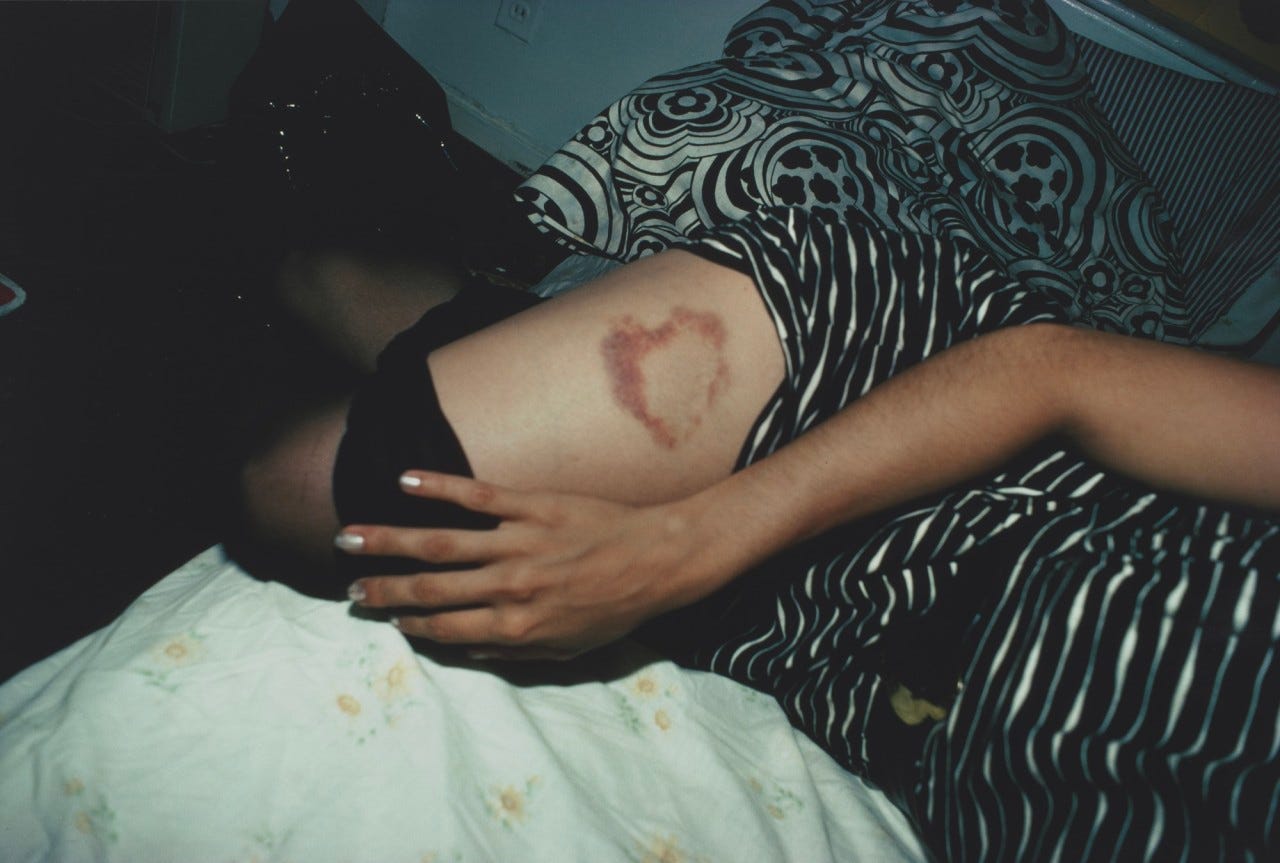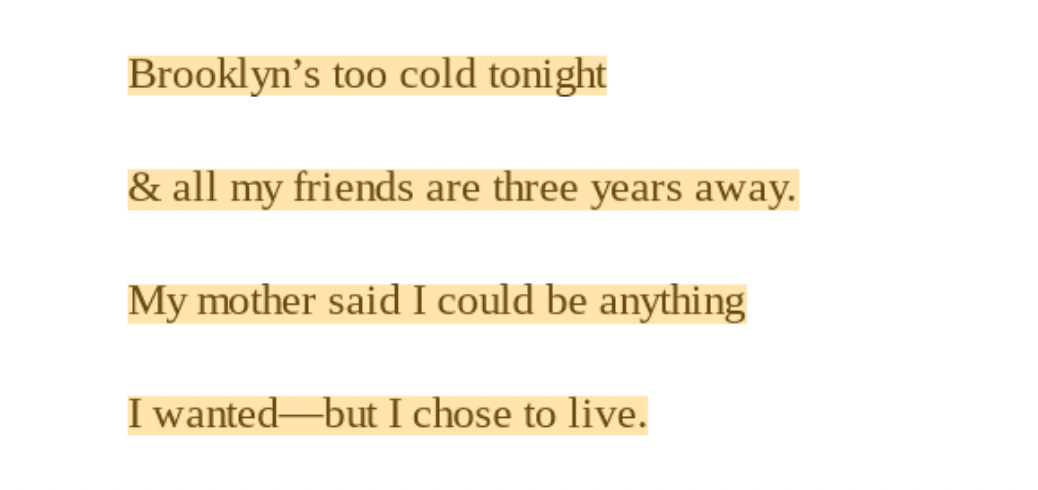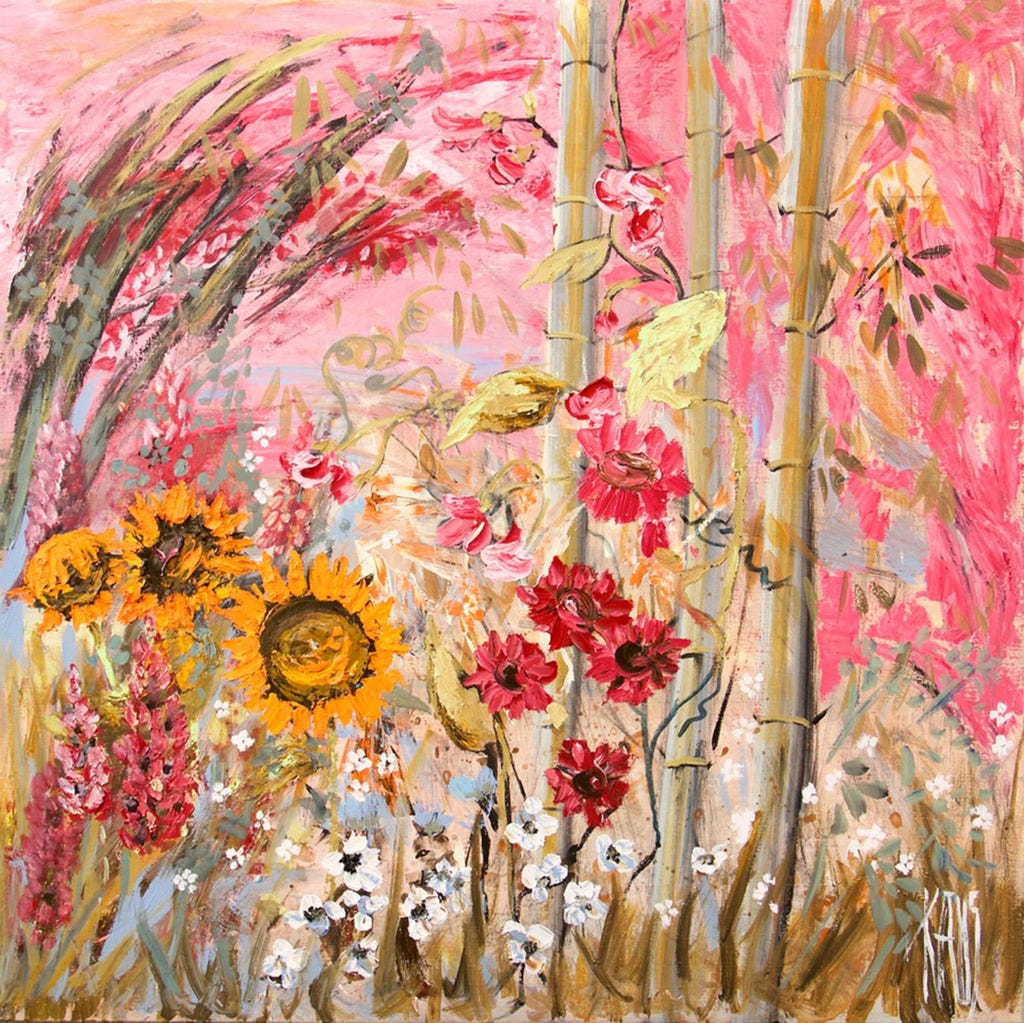Hello, and happy lunar new year ❣️
It’s currently 20:59 on a Tuesday. Of course, it probably isn’t where you are, and it won’t be very soon, until 168 hours later when it is 20:59 on another Tuesday. Welcome. Stone fruit is lovely in the summer — have a nectarine and a cup of raspberry tisane. It is warm with a slight breeze and a pop song of your choice is playing through the speakers.
the type of girl for you
I read Larissa Pham’s Pop Song at the end of 2021 and soon realised that it would stay with me. Pop Song is an expansive foray into trauma, self-harm, loneliness, longing across a series of loosely related essays. The book is driven along by Pham’s background in art history as she traces her encounters with visual art and artists, weaved amongst physical and emotional journeys: Agnes Martin, Yayoi Kasuma, Nan Goldin, Cynthia Daignault, and that is simply off the top of my head. The result is a sprawling, at times fragmentary collection with eclectic points of reference, held together by Pham’s confessional, diaristic voice which makes reading easy.
In the essay ‘Body of Work’, Pham begins with an analysis of Nan Goldin’s photograph Heart-Shaped Bruise before recalling her first years of college, her relationship with her boyfriend at the time, and her use of tumblr between the ages of 16 and 21. Present during the site’s foundational stages — before and during the rise of the ‘tumblr girl’ — Pham describes how, “We were feeling a lot of things for the first time. We were reading Murakami and listening to M83 and on the horizon was shoegaze, and Alice Glass, and the buzzy bass reverb of witch house. In the midst of all this, in the fall of 2010, I left Portland for New Haven.” She’s just like me but not.
Pham recalls her time in college in New Haven in intimate snapshots. From this period branched Pham’s disordered eating and experimentation with sexual submission, arguably two forms of control over the body; on tumblr, a sense of community with other young Asian women developing their understandings of theories of race, gender, and sexuality. This was to become a five-year diary, which she describes as “[her] life’s most consistent project”. In truth, ‘Body of Work’ is an essay about self-narrativization, particularly where pain, abjection, and self-flagellation is involved. Wound theory, if you will.
This brings me to a paragraph which struck me deeply:
It was, and is, tempting to dwell in this close, sticky space, to crave being hurt, to glorify the wound, to want to stay interesting and close to the flesh, poking at the bruise. As long as I have my pain, I know that I can feel something. As long as I have my bruises, I can show that my hurt exists. To stop being hurt — no, to stop calling yourself a hurt person, I’ve realized — means accepting a different way of existing in the world, a new one, with different challenges.
I will admit that I have probably been swayed by similar ways of thinking, though with less awareness. Then again, I tend to repress problems and emotions for as long as possible. It sounds contradictory but I find a way. <3 Following that notion, I wasn’t sure why this paragraph struck me so cleanly, just that it did. It cannot be simple, to reject being defined by hurt and decide instead to live, to find a new way of existing in the world. But Pham goes on to write of Goldin, whose Heart-Shaped Bruise appeared as a part of larger series, The Ballad of Sexual Dependency, and who went on to become an advocate against the opioid crisis she was a victim of: “She opened the room of pain, its unlocked door”.
Pop Song operates like a mosaic, with essays of various depth and detail converging for a fuller work. In ‘Body of Work’ Pham writes about Nan Goldin and references Jenny Saville, two photographers; in “Camera Roll (Notes on Longing)” she details her experiences with photography, her desperate attempts to capture her lovers, to preserve moments instead of living in them. Of course, through Pop Song itself Pham is further memorialising her emotions through writing. Her longing for romance and romanticisation strikes an interesting chord with the fascination with hurt which echoes ‘Body of Work’. Above all, ‘Body of Work’ reads as an essay about healing, placed fairly early on in a book about a breakup. Pham concludes, “What I needed most from my bruises, after all, was not to know that I had acquired them but to know that I had endured”.
Throughout the book, Pham addresses her ex-lover through the second-person ‘you’. The result is that this breakup lingers over the book, even as Pham focuses elsewhere, or traces the earliest stages of their relationship. In ‘Haunted’, Pham is upfront with the audience, opening with: “This part is about trauma”. In the second paragraph, she brings us to “The summer after I finished college, three years before I met you”. Pham presents herself in fractures, her self-flagellation and her loneliness and her desperation for love and her experience of male violence.
I compared Pop Song to a mosaic, but it also contains the desire and emotional vulnerability of, well, pop music at its best, including all its malleable genres (e.g. the indie pop leanings of songs like ‘Dreams’ by the Cranberries or ‘Bags’ by Clairo, different but perfect songs). Something about the undistilled emotion wrapped in a sparkling synth beat, guitar sequence, et cetera. It calls to mind Robyn’s Body Talk, MUNA’s About U and Saves the World (it’s gonna be okay, baby), and of course Lorde’s Melodrama, amongst many other albums. Even Wolf Alice’s latest. However, I am here to talk about Carly Rae Jepsen’s Emotion.
There is an essay I like by Hanif Abdurraqib, entitled ‘Carly Rae Jepsen and the Kingdom of Desire’ (I should read a book by Abdurraqib this year). Abdurraqib reviews a Carly Rae Jepsen concert accompanied by the Toronto Symphony Orchestra which he crossed the US-Canada border to attend; he reflects on Carly Rae Jepsen’s body of work, focusing on her critically-acclaimed, still-commercially-underrated 2015 album Emotion (stylised E•MO•TION, as in, I have e•mo•tional motion sickness, thank you Niri). Abdurraqib lingers more than once the fact that Carly Rae Jepsen does not have mainstream pop star status, which he relates to theories of desire:
It's been said that pop music desires a body — a single, focused human form as an object of interest. Emotion fails in this, I suppose, because its primary characters are desire and distance. Want may be a machine that lurches us toward a newer, more eager want, but the idea alone, pointing at nothing specific, doesn’t sell records. This is one theory as to why Carly Rae Jepsen, despite her ability to home in on a feeling and make it flourish, isn’t the biggest pop star in the world.
One line from the chorus of ‘Your Type’ echoes in my head regularly: But I still love you, I’m sorry, I’m sorry, I love you, I didn’t mean to say what I said / I miss you, I mean it, I try not to feel it, but I can’t get you out of my head. But that’s me.
Pop Song is another work where the primary characters are desire and distance (physical and emotional — Pham vivifies a surprising number of cities). In ‘crush’ (a version of which is available online), Larissa Pham writes: “The crush exists at a point of distance. The less I know of you, the better, because then I can safely project my affections on you. I can begin to write a story, a catalogue of intimacies, a script that we will inevitably fail.”
Pop Song indicates that Pham is prone to this kind of romanticisation, a conflict of idea(l) vs reality, despite her concessions here that the script will fail. Aren’t we all prone to romanticisation? Especially with social media encouraging us to be voyeurs in our own lives, constantly. In another instance, Pham thinks of a line from Frank Ocean, You text nothing like you look. Let me return to the crush as a point of distance. Abdurraqib explains: “The distance between affections is short and often linear. The distance often hangs on circumstance — a brief moment or a song or two hands brushing against each other in a movie theatre”.
Most commentary on desire is at the very least adjacent to Anne Carson’s Eros the Bittersweet. “Desire is no light thing.” “Between ‘I love you’ and ‘I love you too’ the absent presence of desire comes alive.” Eros the Bittersweet itself formulated around Sappho’s fragments and drawing from Roland Barthes’ A Lover’s Discourse (‘bittersweet’ coming from Sappho’s description of Eros as glukipikron, literally ‘sweetbitter’). Pham credits Eros the Bittersweet for her framework of thinking about desire in ‘crush’, pairing Carson and Barthes with the obsessions which often characterise Yayoi Kasuma’s installation art.
I like that Emotion and Pop Song hold desire and distance as their driving forces, taking place on the other side of a relationship. (Abdurraqib describes Emotion as an album about unrequited romantic love for a friend, with ‘Your Type’ as its thesis statement; if so, then Carly Rae Jepsen’s second album, Dedicated, often sees desire reciprocated, still with an emphasis on Wanting). In Pop Song, the breakup does linger over the text, in some places more than others. Taking from Kasuma’s description of her art as “self-therapy”, Pham often grapples with herself through her writing, as is the everlasting impulse of the creator:
Describing this, I think of Carson again — how the lover learns by losing. Does the lack that characterzies eros appear again here, though the boundaries Kasuma disrupts seem different? The colorful dots don’t represent the intrusion of desire, which is just one way of breakdown of the interior and exterior entirely — yielding to a total kind of loss.
Larissa Pham listens to Carly Rae Jepsen. I’m right. It simply makes sense, with the restless desire of Pop Song, and desire in Carly Rae Jepsen’s music being “the living thing at the end of the tunnel, waiting with open arms” (Abdurraqib).
I listen to Carly Rae Jepsen. Like Pham, I get caught up in various things, including love; it’s just that I have so much. In reaction to a feeling the other day I thought about The enormity of my desire disgusts me, which is a line about feeling overwhelmed by your desires, even though they may be normal sized, which is of course tied to internalised homophobia as well as general emotional repression. A heart that offends with its lonely and greedy demands. I have a playlist for that. In the final days of her relationship — ‘Breakup Interludes’ — Pham thinks:
Because I wasn’t generous. I could only hear the cry of my own needs. The only kind of love I knew was the kind that clutched out of a fear of loss, and every time you threatened to shift its meaning, it only made me hold on more tightly.
I don’t know if the entire fault of our rupture was mine. I don’t know if you believed then that I could love you, or if you even believed that you were deserving of love in the first place. I don’t know if you knew that I was willing to try, with what I knew of love. Which, I guess, wasn’t much of anything.
It’s another passage which burrowed into my mind and stayed there, and that’s because I sometimes find myself acting out in fear whilst others retreat. Which is okay. I guess Pop Song reminds me how literature (art as a whole) can reach out to people. In fact, a lot of this has been me articulating thoughts on a book that has inexplicably changed me, and so this is not exactly structured and loops around a lot and I probably quote too freely, but that’s okay! It’s my newsletter and I have said what I wanted. <3
There is something bittersweet about the ending note of Pop Song. The various threads converging into ‘Ways of knowing when its time to go’ and ‘Breakup Interludes’ (with the final interlude simply titled‘Breakup’), giving way to a final essay which finds Pham travelling across the globe to Shanghai as she writes, ‘On Being Alone’. I remember Pham’s assertion that bruises heal, and I wish her the best.
Outside, it had begun to rain. Over the steam of my milk coffee, I looked out the window to see umbrellas popping open on the sidewalk, some red or colorfully patterned, but mostly black. They looked like mushrooms sprouting on a log. Soon I would be down there, with all of those people — I felt, bathetically, a spike of warmth fo every person in the world. My body ached, but I felt strong. Maybe it was finally getting over the jetlag, or may be it was feeling as if I had finally gone to the end of my loneliness, gone to its furthest expanse. I finished my coffee. I dressed for the day.
day after day, life after life
Things for me are about the same as usual. As much as I would like to have a break and then do more study I would also like to not study and also I’m bad at processing the idea of simply doing nothing and so I have been applying for various jobs whilst also trying to take it easy whilst also trying to find things to do. Though I’m growing fonder of the idea of just existing.
Too tired to detail my reading log further but maybe at the end of March I will do a quarterly review, for my amusement. Though I read Pat Barker’s The Women of Troy in January which has put me on a bit of a Euripides kick, which should stretch over the next few months. Still watching Succession with Jordan (subscribe to Jordan). Season 1 finale was bonkers and the show has not returned to the rails and the very end of s2e1 hit us with We Had The World In Our Hands And You Fucking Walked, Man. L for kendall + ratio + this happened in The Social Network
Here is February’s playlist. Mitski’s latest album Laurel Hell which came out on Friday is fantastc we love a dance pop moment. I also love Lucy Dacus’s ‘Kissing Lessons’ which is gay AND Lucy at her storytelling best, and Arlo Parks’s ‘Softly’ is so lovely. ‘Boyfriend’ by cignature has turned out to be a sleeper hit in the charts of my bedroom. I’m trying to listen to more hyperpop, because I like the whole glittery, glitchy vibe, and I like the possibilities of the genre and the space it hyperpop seems to hold for trans and non-binary artists, and artists of colour. In my mind, Sophie’s ‘Immaterial’ the exact centre of the genre, maybe because it is the first plausibly hyperpop song I heard/took to (her impact on pop music truly cannot be overstated). I also think that there’s like, pink/pastel hyperpop and then dark blue/green hyperpop which makes sense to literally only me. I like this video essay!
Later than I wanted, I have been (got the beat voice) sick and tired every day. I know this was long, so thank you as always. Happy year of the water tiger.
Take care,
Joanne
Postscript: I thought it would be neat to crowdsource pop songs to add to this newsletter, so I asked some friends to name some songs, then I remembered that the collaborative spotify playlist function, then I kind of abandoned the idea. Feel free to contribute.
It’s beautiful out there — fields, little lakes and winter trees in February sunlight, every car park a shining mosaic. — 'On a Train', Wendy Cope







this is incredible, Joanne!! i love it so, so much. you've put it all together in such an adept and sophisticated and emotional way and i adore it <3
What an absolute bop. I don't know how i overlooked Hanif's essay on CRJ. Wound theory is fascinating and heartbreaking to look at it through this lens you've framed. I certainly tried to make myself "real" through pain for the entirety of my 20's. Have you read Judith Herman's "Trauma and Recovery"?